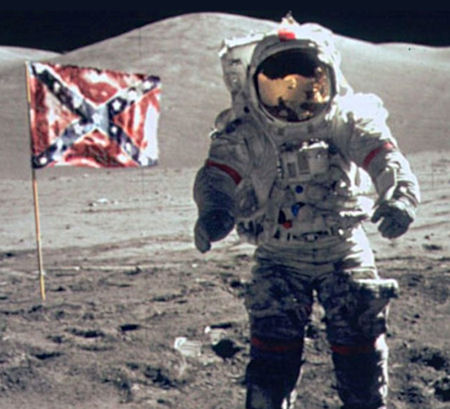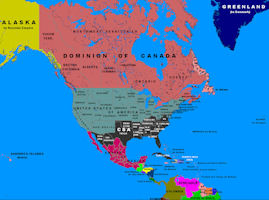
If the South Had Won - Alt-History
 No war has attracted more counterfactual speculation. These counterfactuals are generally of two types, the first focusing on how the South could have won, the second on the life of the Confederacy in the decades after victory. Two prime examples of the "how the South could have won" were Union discovery of Lee's marching orders that led to Antietam, and Stonewall Jackson's wound at Chancellorsville that deprived the South one of the most talented tacticians in American history.
No war has attracted more counterfactual speculation. These counterfactuals are generally of two types, the first focusing on how the South could have won, the second on the life of the Confederacy in the decades after victory. Two prime examples of the "how the South could have won" were Union discovery of Lee's marching orders that led to Antietam, and Stonewall Jackson's wound at Chancellorsville that deprived the South one of the most talented tacticians in American history.
The life and times of the post-War Confederacy are rather more important, because these go directly to the essential question of why Lincoln fought. These counterfactual histories explore the world that Lincoln was determined to prevent.
If the South Had Won the Civil War originally appeared in the November 22, 1960, issue of Look magazine where it inspired a deluge of correspondence from readers. Published in book form in 1961, the novel is a must-have for Civil War enthusiasts. Most of the book consists of events leading up to the surprising CSA victory, with a little about the events that take place after the Civil War. MacKinlay Kantor, Pulitzer Price-winning author and master storyteller, does not describe a victory for the old Confederacy as a triumph for illiberal white supremacists, but rather as a rational and sensible reinstitution of peace and civilisation for both North and South.
Kantor showed how the South could have won the Civil War: how two small shifts in history (as we know it) in the summer of 1863 could have turned the tide for the Confederacy. It all begins on that fateful afternoon of Tuesday, May 12, 1863, when a deplorable equestrian accident claims the life of General Ulysses S. Grant.
Kantor covers relations between the United and Confederate States, the susequent secession of Texas, and combined efforts in the two World Wars. Slavery, was abolished within a few decades, and while African-Americans did not achieve full equality, they were spared Jim Crow, lynching, and other forms of overt repression. This followed the Brazilian model, on the theory that since emancipation was not forced on the slave states, the resulting animosity never developed. Kantor has the North and South reunited by 1915 in the face of WWI and the growing threat to both side-by-side Americas.
The Confederate States of America: What Might Have Been, is not a fictional narrative, but instead a scholarly treatise. Ransom follows the consequences of the "what if" scenario over an extended period of time, exploring such issues as the fate of slavery in a CSA, how the economies of the USA and the CSA would have developed, and how their foreign policies would have differed. What if Lee had avoided defeat at Gettysburg? What if a military stalemate had developed, coupled with growing antiwar sentiment? What if Lincoln had been defeated in the 1864 election and Great Britain had recognized the Confederacy? What would have been the careers of an independent Confederate States of America and a defeated United States? "No historian has thought through such 'what if' questions as seriously as Roger Ransom," says the Washington Post Book World.
The Confederate States of America: What Might Have Been by Roger L. Ransom What if Lee had avoided defeat at Gettysburg? What if a military stalemate had developed, coupled with growing antiwar sentiment? What if Lincoln had been defeated in the 1864 election and Great Britain had recognized the Confederacy? What would have been the careers of an independent Confederate States of America and a defeated United States? "No historian has thought through such 'what if' questions as seriously as Roger Ransom," says the Washington Post Book World.
In Ransom's analysis, the first deviation is that Nathan Bedford Forrest was able to break out of Union encirclement at Fort Henry with 13,000 men. The second was that William Tecumseh Sherman was seriously wounded at Shiloh. After that battle, in the third deviation, Ulysses S. Grant is relieved of Union command. In the fourth, Grant regains his command but was several months late in capturing Vicksburg. The fifth places James Longstreet in command of Confederate forces at Chattanooga. The sixth has Stonewall Jackson recovering from his wound at Chancellorsville.
In Ransom's counterfactual history, the South won independence from the North, returned to the production of cotton for the world economy. Ransom predicts an economic crisis in the 1880s brought on by the rise of foreign cotton markets, low cotton harvest due to depleted soil and declining value of slaves. The South abolished slavery through a program of compensated emancipation. Ransom agrees with Harry Turtledove that the Confederacy would ally itself with Britain while the United States, hemmed in by the British in Canada and the Confederacy to the south, would move into Germany's sphere of influence. The CSA ended up fighting World War I on the North American continent as the ally of the British and French (the Union sides with the Germans). Having lost that war, the CSA was reunited with the North in (re)forming the United States of America.
In Dixie Victorious: An Alternate History of the Civil War, a well-known series of alternate history anthologies now adds this solid and provocative exploration of the American Civil War. Seasoned alt-hist veteran Tsouras and nine other scholars offer 10 ways in which the South could have won its independence, beginning with European intervention or the construction (with British help) of a blockade-breaking navy. More subtle suggestions include Lee's lost order at Antietam being a deliberate deception, or the Union going bankrupt. The high points are probably Edward Longacre's Gettysburg campaign in which Jeb Stuart does his duty (he notoriously did not) and the editor's own somewhat implausible but enormously powerful scenario in which the South adopts General Cleburne's plan to free and arm the slaves. After that, Southern victories change the political equation, leading to Lincoln's defeat in the 1864 election. Evaluating these possibilities, one has to remember Shelby Foote's comment that "the North would just have brought the other hand out from behind its back."
The 1953 novel Bring the Jubilee is one of the earliest alternate histories, set in a United States that lost the American Civil War after a decisive Confederate victory at Gettysburg. The South has gone on to forge its own empire sprawling across Mexico and Central America, a center of learning and culture that rivals the British Empire and German Union. Meanwhile, the impoverished North lies divided and embittered after the failures of their generals and Lincoln - an underdeveloped, economically depressed, powerless nation of poverty, crime, ignorance, and hopelessness. The sad defeated United States was disemboweled and at the mercy of the other great powers.
The mocumentary C.S.A.: The Confederate States of America premi�red in 2004 and was released in 2006, purports to be a documentary about the country�s history - a pseudo-democratic, repressively racist state. The movie is a broadcast complete with mock commercials and public-service announcements. Spike Lee is credited as �presenting� �C.S.A.�, which was writen and directed by Kevin Willmott and produced by the Weinstein Company. With the help of Great Britain and France, the South won the war, overran the North and re�stablished slavery in the period called Reconstruction. The aged, regretful Lincoln is �remembered only as the man who lost the War of Northern Aggression�. Richard Brody wrote "the faux commercials capture the blithe contentment of white people, a fantasy of white supremacy that is inextricable from American history".
|
NEWSLETTER
|
| Join the GlobalSecurity.org mailing list |
|
|
|






